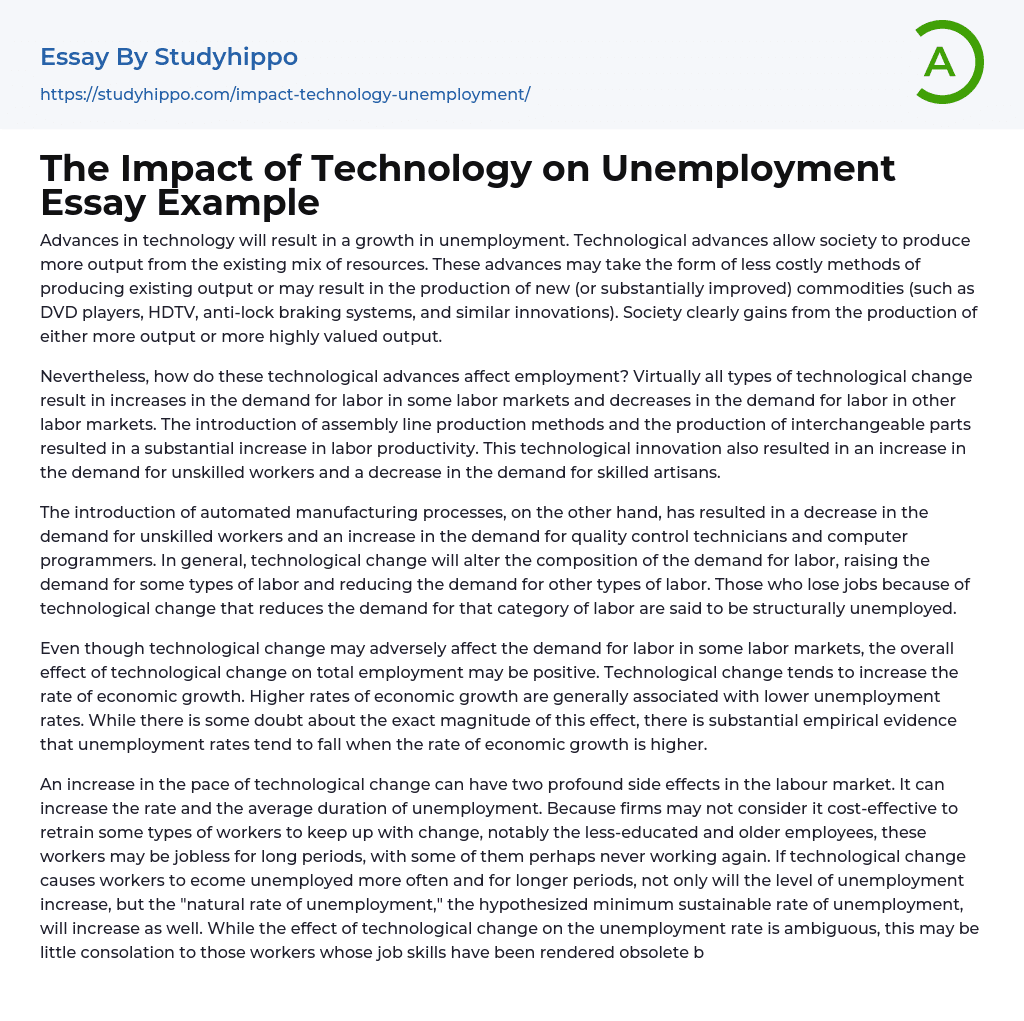Advances in technology will result in a growth in unemployment. Technological advances allow society to produce more output from the existing mix of resources. These advances may take the form of less costly methods of producing existing output or may result in the production of new (or substantially improved) commodities (such as DVD players, HDTV, anti-lock braking systems, and similar innovations). Society clearly gains from the production of either more output or more highly valued output.
Nevertheless, how do these technological advances affect employment? Virtually all types of technological change result in increases in the demand for labor in some labor markets and decreases in the demand for labor in other labor markets. The introduction of assembly line production methods and the production of interchangeable parts resulted in a substantial increase in labo
...r productivity. This technological innovation also resulted in an increase in the demand for unskilled workers and a decrease in the demand for skilled artisans.
The introduction of automated manufacturing processes, on the other hand, has resulted in a decrease in the demand for unskilled workers and an increase in the demand for quality control technicians and computer programmers. In general, technological change will alter the composition of the demand for labor, raising the demand for some types of labor and reducing the demand for other types of labor. Those who lose jobs because of technological change that reduces the demand for that category of labor are said to be structurally unemployed.
Even though technological change may adversely affect the demand for labor in some labor markets, the overall effect of technological change on total employment may b
positive. Technological change tends to increase the rate of economic growth. Higher rates of economic growth are generally associated with lower unemployment rates. While there is some doubt about the exact magnitude of this effect, there is substantial empirical evidence that unemployment rates tend to fall when the rate of economic growth is higher.
An increase in the pace of technological change can have two profound side effects in the labour market. It can increase the rate and the average duration of unemployment. Because firms may not consider it cost-effective to retrain some types of workers to keep up with change, notably the less-educated and older employees, these workers may be jobless for long periods, with some of them perhaps never working again. If technological change causes workers to ecome unemployed more often and for longer periods, not only will the level of unemployment increase, but the "natural rate of unemployment," the hypothesized minimum sustainable rate of unemployment, will increase as well. While the effect of technological change on the unemployment rate is ambiguous, this may be little consolation to those workers whose job skills have been rendered obsolete because of technological change. One of the issues that every industrialized society has to deal with is the extent to which the government should be involved in the retraining of structurally unemployed workers.
A good deal of recent debate has involved the related question of whether the widespread use of computers in the workplace has enhanced productivity. Preliminary studies suggested that the introduction of computers had no significant effect on productivity. Studies that are more recent have generated mixed results. It is clear, though,
that the widespread introduction of computers has, to date, had a less dramatic effect on productivity and economic growth than resulted from the widespread introduction of such earlier innovations as the steam engine, electricity, and the internal combustion engine.
Technology both eliminates jobs and creates jobs. Generally, it destroys lower wage, lower productivity jobs, while it creates jobs that are more productive, high-skill and better paid. Historically, the income-generating effects of new technologies have proved more powerful than the labour-displacing effects: technological progress has been accompanied not only by higher output and productivity, but also by higher overall employment.
- Electronics essays
- Computer Science essays
- Consumer Electronics essays
- Enterprise Technology essays
- Hardware essays
- Robot essays
- engineering essays
- people search essays
- Modern Technology essays
- Impact of Technology essays
- Cloud Computing essays
- Operating Systems essays
- Information Technology essays
- Data Analysis essays
- Information Age essays
- Smartphone essays
- Cell Phones essays
- Camera essays
- Computer essays
- Ipod essays
- Mobile Phones essays
- 3g essays
- Bluetooth essays
- Cell Phones in School essays
- Computer File essays
- Desktop Computer essays
- Servers essays
- Data collection essays
- Graphic Design essays
- Data Mining essays
- Cryptography essays
- Internet essays
- Network Security essays
- Android essays
- Computer Security essays
- World Wide Web essays
- Website essays
- Computer Network essays
- Application Software essays
- Computer Programming essays
- Computer Software essays
- Benchmark essays
- Information Systems essays
- Email essays
- Hypertext Transfer Protocol essays
- Marshall Mcluhan essays
- Virtual Learning Environment essays
- Web Search essays
- Etiquette essays
- Mainstream essays




